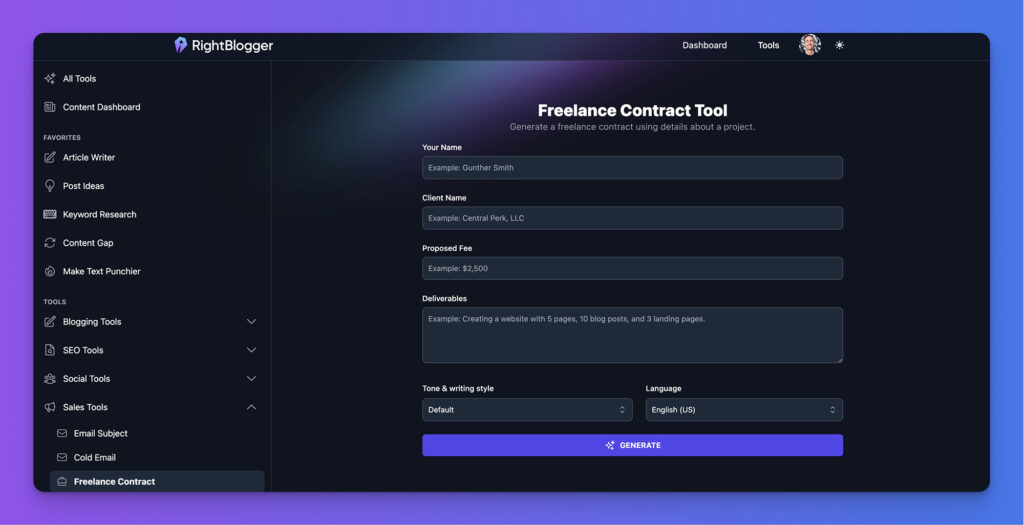Too many freelancers (particularly new ones) rush into working with clients without getting a freelance contract template signed and put into place.
Trust me, I know. It can be tempting to skip the “formalities” of getting a freelance contract signed by your busy client when you’re an independent contractor—especially if you’re just doing some consulting work for a mutual friend, or you’re in the midst of the excitement around landing your first big client. You just want to get to work and start getting paid.
However, not getting even a quick & easy freelance contract (like my free freelance contract template you can grab right here) signed before starting your freelance project can be a potentially devastating decision with far-reaching consequences.
To help you get started and avoid confusion with your clients, I’m giving away the actual freelance contract template I use when signing on new clients like LinkedIn, Zendesk, Intuit, Fundera, Close and more (for free).
Free Download: My Freelance Contract Template (Microsoft Word and PDF)
In my experience since I started freelancing on the side several years ago as an independent contractor, most freelance client relationships will continue on without any issues, but there’s always the off chance that there’ll be a miscommunication about something.
Without a freelance contract template in place within your business, you’re leaving yourself open to non-payment, liability, and potential legal troubles.
Because I hate messing around with freelance contracts so much, I made a freelance contract generator tool (that’s free to try!) over on RightBlogger.
I recommend reading this post all the way through from top to bottom, but if you prefer to jump around, here’s a hyperlinked table of contents that’ll take you straight to each clause you’ll need in a freelance contract. And of course, you can grab my free template right here.
9 Freelance Contract Template Essentials to Stay Safe and Get Paid on Time (Free Template)
- Clear Introductory Statement
- Terms and Conditions
- Scope of the Project
- Changes and Revisions
- Legal
- Copyright
- Payment
- Termination
- Signatures
Disclosure: Please note that some of the links below are affiliate links and at no additional cost to you, I’ll earn a commission. Know that I only recommend products and services I’ve personally used and stand behind. When you use one of my affiliate links, the company compensates me, which helps me run this blog and keep my in-depth content free of charge for readers (like you).
Try My Freelance Contract Generator (for Free)
I’m so tired of every tool you need in order to run a successful creative business costing something. That’s why I made this free Freelance Contract Generator that’s good for making up to 2 free contracts every single week. I wanna see you get paid for your work ❤️
Now, it’s finally time to dive into this deep dive on how to create a freelance contract template to use with clients in your freelance business.
More importantly—by having a freelance contract (agreement) in place before you start your freelance projects as an independent contractor, you’re making sure that both you and the company or individual hiring you, know exactly what your relationship entails—and that you’re leaving no major room for grey area about what you’ll be delivering.
It stands to reason that the best freelance contract template prevents potential disagreements and misunderstanding down the line, should your client change their expectations during your contract period, or in the event you deliver a piece of work that’s not what they were expecting—in this event, a solid freelance contract template will keep both parties happy.
In this post, I’m going to walk through the essential elements every freelance contract template needs to include, whether you’re a writer, designer, marketer, developer, consultant or otherwise. And I’ll be pulling from the actual freelance contracts I’ve used for my freelance content marketing business for years, including deals like:
- An $80,000 agreement for 2 posts per month, that’s continued for the past twelve months.
- Another contract that’s translated into $17,500 for 7 blog posts so far.
- And the last one that solidified a $10,000/mo retainer contract for 4 posts per month.
My freelance business has helped me fund growing both this blog and my AI writing tool business, RightBlogger.
Here’s the real purpose of a freelance contract template
Chances are, even without a freelance contract signed, you still know what your client’s expecting from your new relationship—the exact work that needs to be completed, and in what timeframe.
Your client also probably knows your expectations of them, most importantly, how much they’re agreeing to pay you for the work, and by when.
However, a freelance contract agreement solidifies these conversations that often take place over the phone or via long email threads, and removes any doubt, ambiguity or confusion.
A freelance contract also takes away the opportunity for the (in my experience, rare) unscrupulous party to claim they didn’t know what’s expected of them.
And on top of these more obvious reasons, the sheer act of asking your client to sign a freelance contract with you—clarifying the details of your new working relationship—will give you a chance to fully qualify them and see if they’re really 100% serious about kicking off the project you’ve agreed to.
If they’re not ready to sign a binding contract that states how much they’ll pay you, when, and for which deliverables, then my advice—like the business advice many entrepreneurs have shared with me—is to not work with them at all.
Run for the hills, especially if you have no mutual connection to the potential client (like if you started the dialogue from a cold email campaign and don’t really know anything about them).
Better yet, find a client that does respect and trust you enough to sign a freelance contract with you.

If you don’t get a freelance contract signed, you’ll only open yourself up to the (very real) risk of non-payment after delivering work or running into misunderstandings about deliverables.
Plus, when you have a client who’s Skyping you in the middle of the night, demanding a third set of revisions before they pay you, or changing instructions and requirements the day before the project’s due, you’ll be glad you got a freelance contract signed that stipulates timelines and costs for additional revisions & requests.
Even if you do get your client to sign a freelance contract and things still end up going south, you’ll stand a much better chance of effectively suing the client that won’t pay up, keeping in mind that litigation comes with it’s own new set of costs, risks, and time.
But, you don’t want to go overboard on your freelance contract either
The last thing you want to do is send a potential client a 20-page freelance contract, however.
You won’t get very far sending multiple pages of legalese that covers every conceivable possibility, whether the scenario is likely or not, and it’ll only add more friction between you and getting your client to sign on the dotted line.
That’s why I personally use Bonsai to send out my freelance contracts.
Instead of sending a freelance contract to my new client in just a simple Google Doc format where they’ll need to insert a signature file (or print, sign, and scan it back into a new legal document), Bonsai allows me to upload this exact contract I use, then send it to my clients in a manner that lets them quickly sign with just one click—all digitally.
And seriously, I can’t recommend Bonsai enough. It’s made for freelancers, by freelancers. They even have a free 14 day trial you can sign up for right now and if you end up liking it, upgrading to the full version only costs $24/mo. It’s seriously a steal for how much easier it makes getting my freelance contracts signed.
Regardless of the tools you’re using, there are a few freelance contract essentials that you need to include to make your life easier as an independent contractor.
Try My Freelance Contract Generator (for Free)
I’m so tired of every tool you need in order to run a successful creative business costing something. That’s why I made this free Freelance Contract Generator that’s good for making up to 2 free contracts every single week. I wanna see you get paid for your work ❤️
Disclaimer: Be sure to adapt my freelance contract to meet your own unique needs. This post pulls from the actual contract I use in my business (that has been constructed and tweaked with legal help over the years), but I’m not an attorney and this post should not be interpreted as legal advice
Given the specifics of your line of work, you may want to include other possible clauses that make life easier for you, help protect your type of business, and attract the types of clients you want.
With all of this in mind, we’re going to dive into the essential elements every good freelance contract needs to cover.
9 Freelance Contract Template Essentials to Stay Safe and Get Paid (On Time)
This freelance contract intentionally contains only the most important elements that’ll help you get started today.
1. Clear Introductory Statement to Your Freelance Contract Template
This section is pretty self-explanatory, as it simply introduces the main parties to the independent contractor agreement and offers a very short overview of the agreement.

For simplicity sake, this section of the freelance contract also establishes the “Client” and “Contractor” designations so that both parties will be referred to as such throughout the rest of this binding agreement.
Next, your short overview should describe what, in general terms, you’ll be doing for the client.
Here’s an example of a full introductory statement pulled from a recent freelance contract with a new client of mine:
Ryan Robinson (also known as “Contractor”) will provide Planio GmbH, (also known as “Client”) with blog posts and reasonable promotion/distribution as to the specifications detailed in the Terms and Conditions below.
Simple and concise, that’s it.
You’ll spell out the specific details of your agreement later on in the Terms and Conditions below.
Finally, you’ll want to include a mutually agreed upon start date for the commencement of your freelance contract—when you’ll begin doing the actual work for your client.
I usually establish this future start date over a phone conversation (or email) when finalizing the details of what my client needs and when I can handle getting started.
Otherwise, your start date can be the day your client signs the freelance contract.
Bottom line, there’s no need to get too detailed in this section—just the essentials.
The purpose of your introductory statement is to ensure that you know who you’re working with, and that both parties understand the general purpose of the relationship (expectations), so nobody gets an unwelcome surprise.
2. Terms and Conditions
As a freelancer, you can’t afford to allow any confusion about key expectations with your client relationships, whether they’re tasks you’re expected to do, or items you expect to receive from the client (that help you accomplish your job).
This is the section of your freelance contract agreement that clearly lays out these expectations. Think about preemptively answering questions like, “Will you be using AI-generated content in your freelance writing projects with us?”.

Begin your Terms and Conditions by establishing what you want from your client—principally what the agreed level of payment is, how it should be paid, and when payment is due. Using something like Termsfeed makes this easy and ensures clarity and convenience for both parties involved.
Ideally, you’ll have already agreed to a freelance contract arrangement that gets you paid by the job (or deliverable), rather than by the hour—especially if you’re running your freelance business on the side of other employment—you’re an independent contractor after all, not an hourly wage earner.
By having your payment rate specified clearly at the top of this section, you can avoid any potential disagreement afterward, should your client try and pay a lesser amount once the work is complete.
If you and the client agree to an upfront deposit, followed by one or more progress payments on the way to your final deliverable, these milestones should be outlined and specified here, too.
The next part of this section is very important: Your deliverables.
This is where you’ll bullet-point out specific details about what you’re agreeing to provide the client, and when you promise to deliver them by.

This section does need to be in sufficient detail—enough so that there’s no grounds for confusion.
For instance, if you’re a freelance writer engaged in crafting a blog post for a client about a particular set of blog topic ideas, you should specify here what the post is about, an approximate word count, and the day that it is due for delivery to the client.
You may wish to break the project up and include milestones along the way for larger freelance projects, particularly if there are likely to be different delivery dates for different sections of the project—like a series of blog posts.
Depending on your freelance specialty, you may need to include details about how you’ll deliver your work too.
For example, which file format—delivery as a PDF vs Word document or a JPEG vs Adobe Illustrator source file can be drastically different from the client’s perspective. You could promise to provide both electronic and paper versions of your signed contract, making it feel more like a true legal document.
Many freelance writers and content marketers may promise to provide extras to their clients on top of just the writing services, such as social promotion, teaching clients how to start a blog, answering a few relevant Quora questions and linking back to the original post, meta descriptions, and pitches to publications for coverage.
If you include these kinds of add-on services (like I do with my content marketing consulting), specify them in this section of your freelance contract agreement.
3. Scope of the Project
One of the more frustrating elements of freelancing can be scope creep on a project.
Scope creep is when you and your client agree for you to perform a particular task, but the client asks for extra tasks, add-ons, or an unreasonable number of revisions as you progress through the project—thus increasing the scope of the project. This can be disastrous for any working relationship, even as a freelance contractor—so it pays to specify what you’re responsible for in your written agreement.

If you get along well with your client, chances are that you probably won’t mind doing a little bit extra to make the project turn out that much more awesome—but there’s often a fine line here.
Before long, you can realize that you’ve a ton of extra work for free.
If you don’t establish clear guidelines around the scope of your project within your freelance contract, you don’t have any real evidence to prove that the agreed upon deliverables have indeed changed.
By defining the scope, you can also establish a set ending point for this freelance contract. Think through your answers to helpful questions like:
- Will you be a full-time or part-time freelance contractor for the client?
- Are you going to be working on an hourly rate or on a project fee?
- Is there a clear timeframe (or period of time) when deliverables need to be submitted?
- How will you handle scope of work change requests?
Once you’ve performed all of the tasks within the scope of your project, you’ve technically performed your part of the freelance contract. If your client wants you to perform other work, then they need to set up a new contract for that additional work, not just expect it to be done as part of the initial contract.
Be prepared to change your price (or provide an additional estimate) if you’re asked to do anything outside the agreed upon scope of the original project.
Remember, you’re working with your client, not for your client, so they can’t expect you to perform for free.
4. Changes and Revisions
Closely related to what’s outlined in the scope of your project, this is another section where it’s up to you to spell out how you’ll be dealing with requested changes, revisions or additions to your original freelance contract.
Personally, I like to use very friendly wording here too…

Thankfully, most clients are perfectly reasonable people.
They may want the occasional change based on circumstances that have shifted on their end, but the majority of freelance clients (in my experience) will not expect multiple edits and revisions beyond what’s already expected.
However there are some very picky people out there—often the perfectionists—who never seem satisfied, and consistently want you to change your work. For free, of course.
Common sense rules how you deal with changes and revisions.
If a client wants a minor, sensible change to design or article that’s not going to add much to your time or expenses for the project, there’s no reason why you can’t accommodate their wishes.
On the other hand, some clients are not particularly certain themselves about what they want.
This clause is especially important to protect yourself from this type of client who’s prone to changing the entire direction of the project when you’re halfway through it—which is obviously disastrous to your workflow.
My standard freelance contract agreement allows clients to make changes if they wish, but they’ll have to pay for it if the requested changes come after I’ve commenced work on the specific deliverable.
If you’re halfway through a project that has to be abandoned in order to follow a change in direction, this clause makes it very clear that they’ll still have to pay for the work you have already done.
However, there are some situations when editing is commonplace (and indeed expected).
In these situations, I’d include a phrase stating that your quote includes one edit (or x number of edits) within a set number of days of delivery.
5. Legal
Again, I’m not an attorney, but I’ve learned and consulted with several attorneys over the years about how to legally protect myself while doing freelance work on the side of full-time employment.

While I’ve been fortunate enough never to have been stiffed on payments by a deadbeat client (yet) or make any disastrous mistakes that warranted close examination of my freelance contract with the client, the first place I’d turn in one of these two events is the legal section of my contract.
The legal section of your freelance agreement needs to protect you from the 1 in 100 situations (hopefully less frequently) when the unexpected does happen and something goes wrong with your client relationship.

You’ll see in my freelance contract template that I’ve included a few sentences that indemnify me from a broad range of consequences a client may believe they suffer from as a result of my work—the work they’ve approved and hired me to do.
Depending upon the type of freelance work you do, it may be worth adding a clause to your freelance agreement about how you’ll handle any confidential information that’s shared with you during the scope of work for this project. Add to that whether or not you’re willing to sign a non-disclosure agreement (NDA) or non-compete agreement, which in my experience are pretty common practice.
I also include a clause stating that if any part of this binding written agreement is not crafted with enough legalese to stand up in a court of law, then that won’t affect the remaining provisions of the freelance contract. While this might sound like unnecessary legalese, it’s actually really important. Though to be super clear, please don’t take this as legal advice from me (as I’m not an attorney).
You don’t want your entire freelance contract to be thrown out on some legal technicality you’re unaware of.
6. Copyright

One of the more interesting features of US copyright law (that freelancers should read and pay attention to) is the portion about Works Made For Hire, as the copyright law itself even says, “The concept of ‘work made for hire’ can be complicated.“
In a nutshell, Works Made For Hire states that if a client contracts a freelancer to produce work, and nothing is said about copyright ownership in any agreement, then the copyright actually belongs to the creator, not the person who pays for the work to be done. Clearly, intellectual property rights are complicated business.
So as a freelancer (if you do work without any agreements in place), even if that is a paid project, you actually own the copyright to that work unless you otherwise release it to the client. To be clear, that means you’re the owner of the intellectual property rights to what you create for your client, unless otherwise stated in the scope of work for this working relationship.
Seems kind of weird in this context, right?
Well, that’s why any savvy client will know about this quirk in copyright law, so if you don’t have a provision allowing for this in your freelance contract, expect the client to ask you to sign their version of a copyright release at some point down the line.
Plus, it’s in your best interest to proactively address this in your written agreement with a client (like I do with my template). You don’t want your new client to feel like you’re trying to pull a fast one on them.

Short and simple will do, all you need is to establish clear ownership transfer of the work you create—after you’re paid for creating it.
There is of course, one exception I like to include in all of my freelance contracts when it comes to the copyright section. As freelancers, we like to (need to) showcase our work in order to attract more clients and close more deals.
Hence, it does make sense to include a section in your freelance contract agreement that permits you to use work you’ve created for highlighting in your freelance portfolio, showcasing your skills, and even for use in a greater content marketing strategy that’s designed to attract more clients.
7. Payment
There’s nothing worse than not getting paid for your hard work as a freelancer. Here are a few helpful FAQs I get that are worth thinking through ahead of signing a freelance contract with any new client:
- Will you be getting paid upfront for your freelance work?
- Do you want a 50% deposit before starting the project?
- Are you comfortable submitting an invoice and taking payment after completion of the freelance job?
- Will you accept credit card or PayPal payment from your client, or do you prefer bank transfer? Maybe they have a specific payment process for their contractors already.
- Are you open to working with clients on a flexible payment schedule or will you pause work if payment is delayed?
You don’t want to risk having your payments delayed because the client wants to pay you through some complicated combination of money transferring services—nothing derails the excitement of a work from home job quite like being toyed with on client payments. Using invoicing software can be an effective method to encourage customers to make payments more promptly.

We freelancers, like everybody else, have bills to pay.
Whether you’re seeking out well-paid freelance jobs or looking to bring on a couple remote jobs on the side of your full-time gig, your freelance income is self-employed income. You’re an independent contractor with a small business to run, and you probably have plans for that income—savings, keeping the bills paid, affording the next family trip, investing or otherwise.
Not having clear payment terms stipulated in your freelance contract leaves room for clients to delay payment. Here’s the section about payments I include in my own written contracts:

This kind of payment (once per month) works best for me, but you may want to stipulate more payments spread out across the month or otherwise depending upon your type of work.
You can also stipulate that payment be made on a shorter (or longer) timeline after you’ve invoiced the client.
But without clear expectations around payment, it can make budgeting extremely difficult, and your income unpredictable at best.
You can get paid a couple of thousand dollars one week, and only $50 the next.
If you don’t specify when you expect your clients to make payment, then they can choose to pay you whenever they want, rather than when you want them to.
You may also choose to clearly state (or list out) acceptable payment methods in this section too—which is pretty important to clarify as a self-employed freelance consultant with a small business to run, so that you’re making sure to get paid on time. This is all part and parcel of sending and receiving invoice emails that are clear, concise and involve not a shred of ambiguity about the obligations of either you or your client.
8. Termination
This is your emergency eject button.

A termination clause allows either party to exit the binding contract, in the event the relationship is clearly not working out for any reason.
I’ve seen cases where freelancers have had ongoing contracts they’ve worked on for a year or more, that have suddenly come to a halt with a one-line email from their client (or even just a complete drop off in response), stating that the work is over with—today.
At least with a termination clause written into your freelance contract, you have a little more time to prepare for the future loss of income if a project gets suddenly axed. Plus, you can specify whether or not there’s going to be a kill fee for terminating your written agreement early.
It also gives you and your client an exit clause for longer-term contracts that have worked out well, but are now either winding down or possibly, because of changing external events, need to be wrapped up.
Perhaps you’ve decided to move in a different direction with your freelance business, for instance.
9. Signatures
It wouldn’t be a freelance contract without the signatures of both the freelancer and the client.

You’re now at the finish line, and as the great Anais Nin said in one of my favorite motivational quotes, “Great things happen to those who hustle.”
So, it’s time to get your freelance contract template signed.
You may choose to do this digitally (which I recommend) using an easy one-click signature tool like Bonsai.
Or you can get their signatures directly within the Google Document, via email with scanned signatures, by mail or by using a free online signature maker. No matter if you’re a writer, if you do web design—or you’re a software developer, marketer, project manager or any other type of freelancer—get that contract signed before you start the work!
Personally, I use Bonsai for getting electronic signatures, which makes finalizing freelance agreements with clients in different geographic locations as easy as possible. And if any changes need to be made on a case-by-case basis when you write a freelance contract for a new client, it’s super easy.
If a freelancer is given a standard service contract agreement by a client they have to be careful to ensure they know what they are signing. Some contacts have very nasty one-sided clauses in them. For instance, some firms include restrictions that stop you from writing for anybody else. This puts a freelance writer who normally works with a range of clients, in a highly dependent and precarious position.
By getting in first and providing the independent contractor agreement for a deal between you and your client, you have an opportunity to ensure that the terms are fair and not one-sided. It also makes you look professional.
Try My Freelance Contract Generator (for Free)
I’m so tired of every tool you need in order to run a successful creative business costing something. That’s why I made this free Freelance Contract Generator that’s good for making up to 2 free contracts every single week. I wanna see you get paid for your work ❤️

The way I look at it is like this… As long as content is King online, there will always be internet job security for bloggers and content marketers who dedicate themselves to making the side hustle work for them. 🙂
Agreed! And as long as you have a freelance contract in place *before you start doing work with clients, you’ll be just fine 😀
Exactly, Ryan. Thank you for your valuable feedback. 🙂
In my personal opinion, I feel if Freelancers really want to get paid on time and Before Time, the best way to achieve that is to have your own blog or website and sell advertising space. How do you feel about that, Ryan? 🙂
As always, this post was informative and thorough. Really appreciate the template too!
I’m surprised not to see anything about communication and schedule preferences, though. Is that something you’d recommend including in the Terms and Conditions section? My concern has always been a client expecting me to be “on call” so to speak late at night or on the weekend, outside of my normal working hours, because I haven’t stipulated what those hours are. This section could also help you state that the best way to reach you is [phone, email, etc.]. What are your thoughts?
Thank you for the kind words, Beth! Glad you got something out of it (and the template).
I like your suggestion, I think that could be very applicable to certain types of freelancers/client relationships. Do you have a clause you like to use for communication & schedule preferences? For the kind of work I do (content marketing) with my clients, it’s more or less strictly deliverables-based and doesn’t matter so much when I do the work—there are also pretty much never “fires” that need to be put out at odd hours or on weekends, but I could see how someone doing freelance development work may need to be on-hand for emergencies (and stipulate how to be contacted/when is appropriate in that case).
That being said, the vast majority of freelancers I’ve known don’t seem to have had the issue of being contacted at odd hours for work-related issues. Could be a good (simple) addition to your freelance contract if this is something you’ve run into before though!
Ryan, thank you so much for the template! And thanks for turning me on to DocuSign.
I don’t own a fax machine because I despise faxing. (I know that sounds crazy, but there it is.) Having said that, do you think freelance writers need fax machines, or do you believe DocuSign, or some other comparable service, suffices?
You’re very welcome, Tara! And GREAT question…
I’d say the answer is… it depends. Do the clients you (want to) work with require you to have a fax machine? I know for what I do (freelance writing & marketing for startups), the fax machine is dead and long gone. I’ve actually never owned one. If you work with medical clients or hospitals, I know that at least in the U.S. faxing with those kinds of organizations is still prevalent.
If you’re not working with medical companies, I think you’re 100% fine without a fax machine. Services like Docusign are awesome for the specific reason that you can just digitally send & sign your documents without the cumbersome step of faxing.
Plus, you can always sign up for an internet fax service that’s free or cheap to hedge your bets or if you’re ever in a pinch. I’d look into efax, myfax and faxzero to compare options if you truly need a faxing type of service.
Short answer though… don’t invest in fax unless you absolutely have to. I think the fax machine is dead (for almost all industries).
Thanks again, Ryan.
Funny thing. I intend to work with healthcare institutions. Thankfully, you’ve given me some alternatives to check out.
Hey Ryan! This was super helpful, thanks for the great post. It was especially useful to know contracts can be nixed due to a legal technicality and that freelancers own the copyright to the content unless explicitly stated. I’m excited to put all of these into the practice with your template.
Woo! Yes indeed, contracts are one of those things that you hope to never need to enforce, but when you do you’re always glad they’re in place 😂
Thank you so much for this! I’ve been doing some freelance writing on and off for about a year now. However, I haven’t taken it as seriously as I could have been. So seeing this article definitely has grounded me and reminded me to take my work very seriously. Very clear, concise and understandable guide. Thanks again Ryan.
Is it important to write a guarantee too? I had a client tell me she wants me to boost a number of followers per month and to give a target growth number for each platform. I said I can’t guarantee something like that bc it’s social media and people can follow or unfollow based to their liking. She then responded “are you motivating the client to work with you and assuring them you will boost numbers without more specific targets“ and I just said I have to protect myself should something happen that is out of my control. What do you recommend to write in the contract that says it’s not guaranteed?
Good question! Personally, I wouldn’t recommend guaranteeing results for something like this (as you’ve already identified yourself… hitting a certain number of followers is partially out of your control).
The best answer here though is… it’s up to you!
You don’t *need* to offer a guarantee, especially if you’re not personally too confident in the ability for this person/IG account to be able to hit their desired follower growth goals. In my opinion, this could also potentially be a small red flag about this client and their expectations for the work you deliver… they might not be too realistic in what they’re hoping to get out of the project.
Keep in mind that I’m not an attorney, and can’t guarantee that this will be legally binding/hold up in court, but I’d add a simple line or two in the contract that says something to the effect of, “While contractor does guarantee the delivery of all milestones and action items agreed upon here, contractor cannot guarantee specific results in terms of number of new followers, likes or comments, due to the dynamic nature of social media platforms.”
Is having a freelance contract necessary? Based on my experience and friend’s experience, if you want to be paid and safe, look for a great and legit client.
Well, it goes without saying that you want a great and legit client. When you see any potential red flags that they may not be a trustworthy client, run for the hills. A freelance contract is a very smart best practice to have in place, and as you do larger (and higher priced) gigs, it becomes more important as a layer of legal protection in the event of unforeseen things happening…
For example, what if your client declares bankruptcy while they owe you $10,000? Having a contract that clearly outlines the terms of your agreement (and exact amount owed for services rendered) will give you a much stronger chance of recovering at least some of what you’re owed during court proceedings. If you just have an email thread or handshake agreement, that’s not as sturdy.
Hi Ryan,
Hope all is well. I just wanted to double check with you on the Bonsai price of 2$ a month, has this changed to $16 a month. I wanted to make sure I didn’t miss a promo code.
Thx!
Thanks for the heads up on that, Dolores! Looks like their price per month has indeed gone up to $16 now. Just updated that in the article, and sorry if that caught you off guard.
Great post as always Ryan. You touched an important point there with the “legal wording”.
It seems like most attorneys would rather have a contract written with “legal wording” than in a friendly manner, I always frown upon really complicated wording contracts and I get a feeling I should just bail out before it’s too late.
Great article! You hit on a great point in the copyright section about transfer of ownership only after you’ve been paid.
You might consider updating your contract language with “Upon payment”:
“Upon payment the Client will own the copyright for materials created under this agreement…”
Hey Ryan what an an amazing post! Just what I needed.
I do have a question, if you’re working with someone in a different country how will your contract help in disputes with regards to payment?
Great question, Janessa.
To be 100% honest with you, I’m not the most qualified person to give you a great answer to this question as I’m not an attorney or accountant—my advice is that if you’re doing a lot of business across country borders, then it’s worth investing a small amount of your time/a few hundred dollars into consulting with a local attorney who’s helped other people navigate cross-country contracts in your situation.
Where my mind goes first though, is having a clause in your contract that clearly states which legal jurisdiction any disputes will take place in—that way, you can take a client who owes you a large outstanding balance to court in your local city/state/province (rather than in their home country which would be more costly).
That being said, the underlying assumption here is that yes you’ll need to be prepared to file a lawsuit demanding payment for your services provided in the event that your client breaches the contract and decides not to pay you. It’s a lot easier (and cheaper) to decide NOT to work with a potential client today if you get any sort of negative feelings about their legitimacy/ethics. I’ve passed at the opportunity to work with people/companies that have mixed reputations for this reason… it’s not worth the headache.
Thanks Ryan. That was helpful advice!
You’re very welcome, Janessa!
Great template and tips! Thank you so much for sharing your knowledge and advice!
You’re welcome, Kate!
Hi, Ryan! Thank you for all the useful info!
I had a strange experience with a client and I still don’t understand what exactly happened. I found a company looking for an intern for graphic design and reached out to it. They liked me and wanted me to make a test for a contractor because their interns where only San Diego based. I did the test, they paid me immediately for it and were satisfied with the work I have done. They wanted to introduce me to their Teamwork platform and start working.
Since that was my first freelance job I had some technical questions. I am from East Europe and in my country if you work as a freelancer you need to register as one. In order to register and report your monthly income, you need a contract basically saying why and where from you get your money and a print screen of the transfer (PayPal, Revolute, whatever), so I asked them for a loose contract in form of an email. What they said was “For the contract, we’re not sure how that works for your country exactly, its definition of contract, we don’t usually provide freelancers contract for specific amounts of time but we can navigate that as we go.” but then with the next email when I asked about deadlines, payment, etc. they told me that my questions get a little bit too much and they would like me to reach them again after a few months. Now I am wondering will they ever be willing to sign a contract. I am not informed about USA laws. Is there any kind of obligation for them which could bother them? They were very open in the communication but something made them turn away. I am afraid to ask again.
This is very interesting, Preslava. I’ve not personally experienced this myself, but it sounds like a potentially shady/bad thing that the company is unwilling to sign a contract with you. If that is the only reason they’re choosing to not move forward with you, then I think you probably avoided what could’ve been a very (potentially) negative client relationship. There could be some legalities I’m missing somewhere in here (I’m not a lawyer), but there’s no reason in my mind that they shouldn’t be able to sign a simple contract outlining at the very least… things like how much you will be paid, when payment shall be made and for what work deliverables.
And even as a US-based employer myself, with some freelance contractors based in other countries, I sign contracts with my contractors all the time.
Keep looking for the right clients, you’ll find them out there 🙂
Thank you, Ryan!
I have the same concern. What’s more, the company has no more than 10 employees. I guess there is something shady or they are just not willing to go the extra mile (they weren’t looking for someone with that exact position).
Can I ask you something else? Is it ok if the payment is based on working hours and the contract doesn’t have a fixed amount of hours, just depending on the existing work every single month? Or you should have a new contract for each month with a fixed payment?
Yeah, it’s totally fine if payment is based on working hours (as long as your contract stipulates that and you also mention in the contract that you’ll track hours each month and issue an invoice based on the amount of work you’ve done in that period).
Hi Ryan!
Just wanted to drop a note of thanks as I found your blog post after doing extensive research to find the right info I needed to create my own proposal. Everything you said above resonated with me and it is so clear, concise, and friendly even!
Thank you so much for putting this together! It was SO helpful 🙂
You’re very welcome, Carissa! Glad you found the template & tools helpful 🙂
Greetings!
This is Justine, the one who requested for the copy of your “Downloadable Freelance Agreement” for free, I just want to inform you that I already received it.
Thank you for your kindness and generosity. I assure you this file will serve as my guide only to create a Freelance Agreement and not to plagiarize your own work. Of course, I do not want to create issue between us because of plagiarism. I do respect you and your work. Again, thank you very much. Also, this will be helpful for me as a beginner in the world of Freelancing. I find ideas how to create “Memorandum of Agreement” and luckily I saw you. I really appreciate your efforts, time and of course your shared knowledge and experiences. Keep on going, keep on sharing your gained lessons to everyone.
More power and God bless!
Sincerely yours,
-Justine, Philippines
Ah, you’re so welcome Justine! I’m really happy to hear you’re putting this template to work 🙂
Good luck with your freelance projects!
Hello Ryan,
I wish to get your permission to download your Freelance Template above. Thank you.
Regards
Of course! Please do so. You can download it right here: https://www.ryrob.com/freelance-contract-template/
Thank you so much sir for this template and blog post which is very informative.
I have a couple of questions to ask you:
a) Is it okay to draft and use a freelance writing contract for a client that I am volunteering to offer services for free? Even if it is for a short period of time e.g. a month just for experience purpose because I’m just really getting started with freelance writing.
b) Secondly, could you please shed more light on the issue of payment to freelancers living in other countries. This is because I live in Nigeria and I want to have a legit information on a good payment system I could opt for supposing I get a freelance gig from a client based in America.
Thanks!
You’re welcome, Solomon! Some answers for you:
A. If you’re offering your services for free to a client as a 1 month test/for experience, then I don’t personally think you need a contract… unless you want to use a contract that stipulates it’s ok for you to use the content you create for them as portfolio pieces you can highlight on your website/elsewhere.
B. I’ve long used PayPal as the primary way of sending payment to contractors I’ve used that are based in countries outside of the U.S. Is that feasible for you?
Wishing you lots of great projects soon!
Thanks a bunch, sir.
Well, I don’t really know how PayPal works. Could you please give me any invaluable info on it?
Thanks
You’re welcome, Solomon. The basic premise of PayPal is that you can quickly/easily send invoices to your clients and they’ll be able to pay you (through the PayPal platform) for free or at a very low fee.
Alright, thank you Ryan for your response. I appreciate.
You’re welcome!
Hi Ryan,
It is a great post for freelancer, how to pick pick a project, legal process, and getting payment from client. A complete guide for freelance.
Hey Ryan, great post on freelance contracts! Your suggestions will definitely come in handy. I’d like to offer a suggestion as well. Our company, RPost, offers RSign as a digital signature service. I’d like to take this opportunity to introduce you to it. Feel free to explore the tool; it’s free to use up to a certain limit. Thanks again for your article!